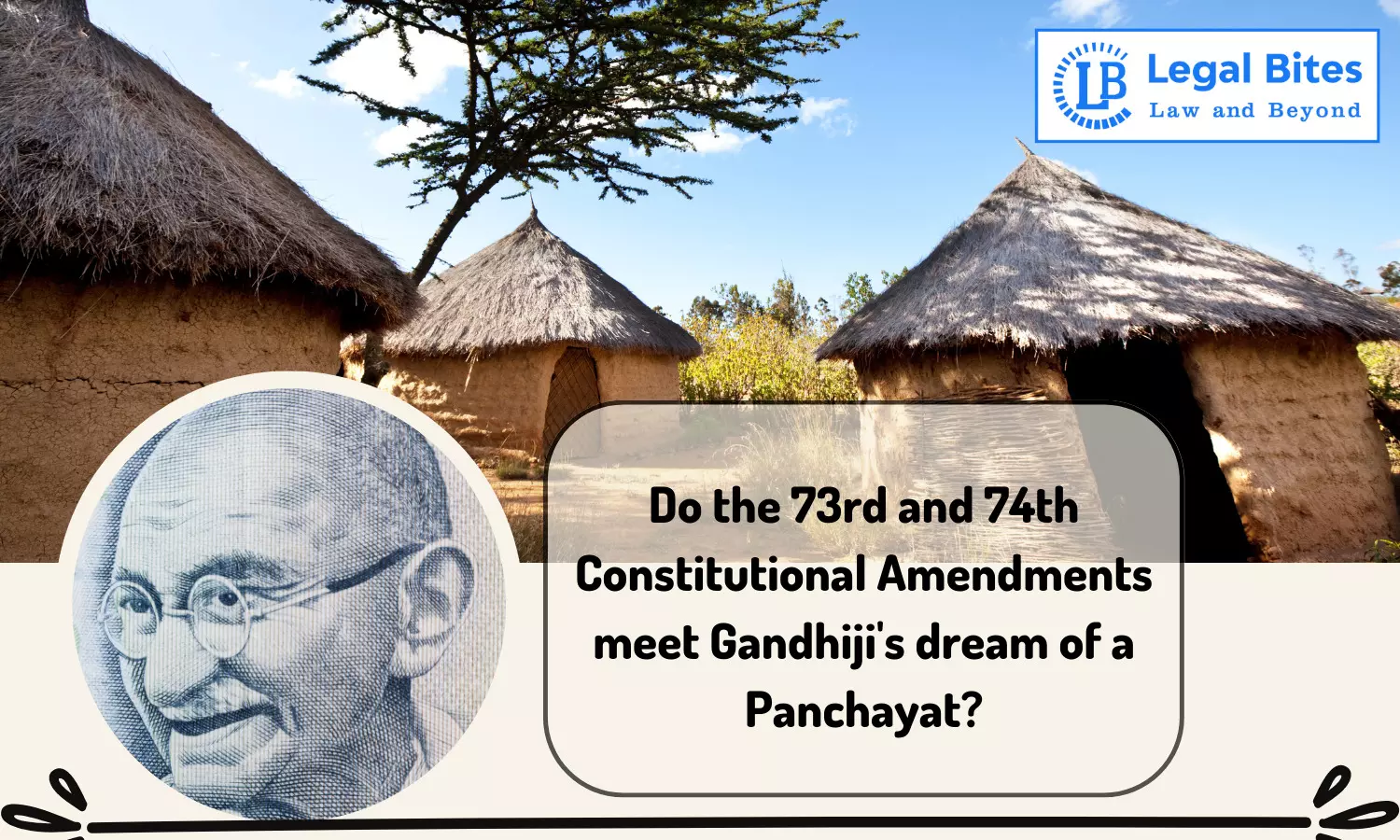Do the 73rd and 74th Constitutional Amendments meet Gandhiji's dream of a panchayat?
The article 'Do the 73rd and 74th Constitutional Amendments meet Gandhiji's dream of a Panchayat?' by Nikhil Yadav is a perusal of the need and importance of the Government's step in the aforesaid constitutional amendments

The article 'Do the 73rd and 74th Constitutional Amendments meet Gandhiji's dream of a Panchayat?' by Nikhil Yadav is a perusal of the need and importance of the Government's step in the aforesaid constitutional amendments. The article revolves around the ideologies of Mahatma Gandhi and their relevance to the present panchayat system.
“The voice of the people may be said to be God's voice, the voice of the Panchayat.” – By Gandhiji
A Brief Introduction: Mahatma Gandhi's Viewpoint
Gandhi ji is well-known, not for his image in Indian currency, but for his efforts and dreams for India. Without Gandhi ji, India today would not be the same. Gandhi ji travelled extensively throughout India to establish his ideal village system. The vehicle of the ideal political and economic system starts with its fundamental component, which is the village system. An individual has maximum freedom and opportunity to develop his personality to the greatest extent. The state on which the roots of democracy depended would be eliminated in these republics. According to him, centralization cannot be sustained without adequate force. It cannot be overstated that Gandhi's viewpoint is opposed to centralization or unitary government.
Panchayat System
Panchayat is the lowest and most fundamental unit of a decentralized system. Participatory democracy should be followed in politics, and everyone should be permitted to participate directly. The greatest use of the resources available in the village is fundamental to the development of the panchayat. Gandhi ji also said that ”Democracy becomes an impossible thing until power is shared by all, but let not democracy degenerate into mobocracy.”
Gandhi ji also proposed a government scheme under the Gandhi ji Constitution, beginning from the primary unit, the village panchayat, up to the level of the All India Panchayat, with the power being assigned to all levels of the government.
In his presidential address at the Belgaum Congress, Gandhi said that the panchayat was not only the right medium for securing cheap justice but also an instrument for avoiding reliance on the government for the settlement of mutual justice.
On the occasion of the 68th Independence Day, Prime Minister Mr Narendra Modi announced- the “Sansad Adarsh Gram Yojana" for the empowering Indian village.
"I know that work (of shaping the ideal village) is as difficult as making India an ideal country," Gandhi ji said. He will have provided a pattern not only for the whole country but perhaps for the whole world. "More than this, a seeker may not aspire to.”
Significance of 73rd and 74th Constitutional Amendments
The 73rd and 74th Constitutional Amendments show that the government realized that the centralized government was insufficient to solve the basic issue. Gandhi ji said that.
“Our cities are not India, India lives in her seven and a half lakh villages."
The issue could be resolved through a bottom-up approach. The Panchayat-Panchayat-PESA Act is significant to the history of the Panchayat Raj Government, which understood that the Adivasi people were trying to protect their "Jal Jangle and Jamin." They enjoy their cultural and historical rights through the PESA Act of 1996.
Dr George Mathew is the president, and he presents the context of the Gandhian point of view in the panchayat. He stated that in the past several years, there has been silence about panchayats. Panchayat must break the silence. He questioned that “the dream of Mahatma Gandhi is yet to be realized; are we going to realize it?" The basic question still remains, “How do we reach out to these village panchayats?” Later in his address, he said, “We have been suffering because of the pandemic in the past and present." In the constitution, 29 subjects are given to the panchayat; nearly 30 years have passed. Is the Indian constitution's grant of 29 subjects to the panchayat a reality? He even wrote an article in the Times of India on April 15, 2013, called “Panchayat Raj or Collector Raj."
National Panchayat Day: the first national panchayat day was celebrated in 2010. Since then, every year, on April 24, national panchayat day is celebrated in India. On this noteworthy day, the union minister of panchayat raj organizes the national conference and awards the best-performing panchayats with the panchayat Sashaktikaran Puraskar/Rashtriya Gaurav Gram Sabha Puraskar.
In 2022, we became the 12th national panchayat, and on the same day, the Prime Minister launched the e-property card under the SWAMTIVA scheme.
In 'India of My Dream', (chapter 25), about Panchayat Raj, Gandhi ji wrote,
“When panchayat raj is established, public opinion will do what violence can never do."
The present power of the zamindars, the capitalists, and the rajas can hold sway so long as the common people do not realize their own strength. If the people do not cooperate with the evil of zamindari or capitalism, they must die of insanity. In Panchayati raj, only the panchayat will be obeyed, and the panchayat can only work through the laws it makes.
References
[1] Gandhian concept of village development and India's development policy, Available Here
[2] Adarsh Gram: A Gandhian Dream of Gram Swaraj, Available Here
[3] Gandhi and Panchayati Raj System in Present Context, Available Here
[4] National Panchayati Raj Day, Available Here
[5] Panchayat Raj, Available Here
Important Links
Law Library: Notes and Study Material for LLB, LLM, Judiciary, and Entrance Exams

